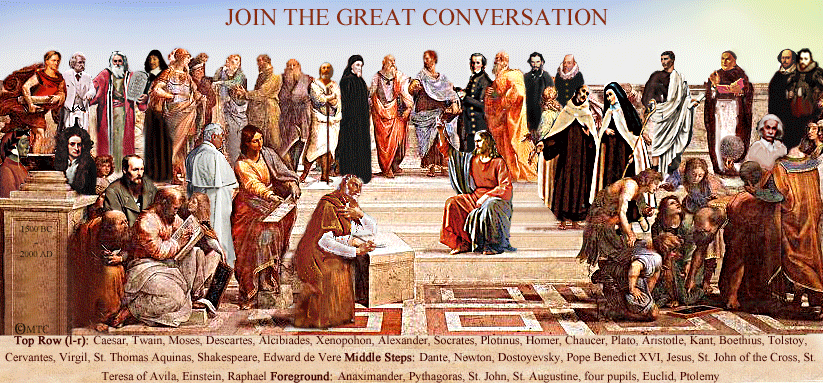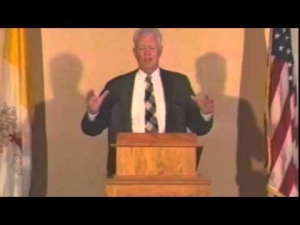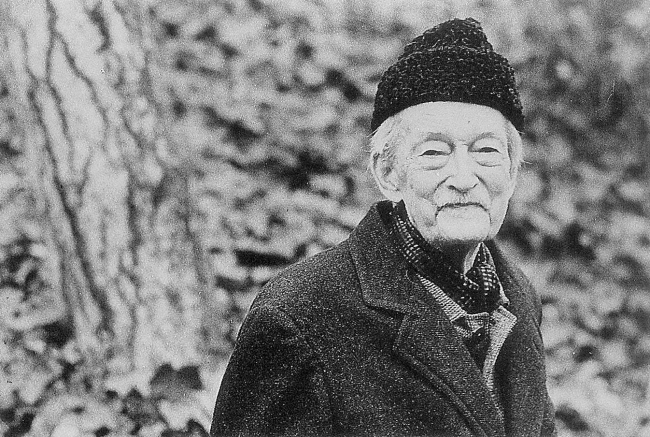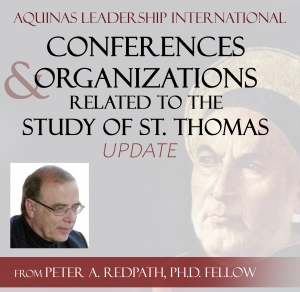
The Intellectual Culture of the Adler-Aquinas Institute
 When biologists wish to investigate a specific microorganism, they often create a culture for it in a lidded Petri dish (or Petri plate or cell culture dish). In this way, in a controlled environment, they can introduce and measure proper nutrients to make the bacteria thrive or die. Biologists can protect the culture in the dish from harmful elements and regulate all sorts of environmental factors, such as temperature, light, vibrations, and so on. This is such a well-recognized and successful technique that failure to utilize petri dishes or their equivalents in many experiments would be tantamount to gross negligence.
When biologists wish to investigate a specific microorganism, they often create a culture for it in a lidded Petri dish (or Petri plate or cell culture dish). In this way, in a controlled environment, they can introduce and measure proper nutrients to make the bacteria thrive or die. Biologists can protect the culture in the dish from harmful elements and regulate all sorts of environmental factors, such as temperature, light, vibrations, and so on. This is such a well-recognized and successful technique that failure to utilize petri dishes or their equivalents in many experiments would be tantamount to gross negligence.
We know that we, too, live in a culture, in societies of which we form a part, such as our families, neighborhoods, cities, states, nations, or international societies of one sort or another. Each has potentialities to influence and expand or restrict our behavior, health, thoughts, freedom, lives. Microorganisms have no say about what goes into the petri dish with them—those decisions are made by a higher power. Some, not all, of the elements put into the cultures in which we find ourselves are also decided by higher powers. Human beings often have free choice to select contents for our own petri dishes. Assuming this is so, would we not be grossly negligent, perhaps morally culpable in some cases, if we did not do our best to make sure the elements being introduced into our culture are safe, nutritious, life-giving and good for us, our children, families, neighbors and larger societies?
 In complex societies such as ours, simultaneously we live our lives in more than one type of culture. We may spend part of our time in a work, business, or internet culture that is different from our home, religious, or artistic culture. Such cultures often overlap and spill over into one another within an intellectual culture that includes many elements erroneous and toxic to a healthy intellect. Today, “philosophies” falsely-so-called dominate and infect the wider, intellectual culture, have permeated our schools of theology, social science, humanities, fine arts, economics, politics, and even physical science. These misnamed “philosophies” bring with them first principles of judging truth that are not fit nutrition for any culture, which undermine any culture that mistakenly adopts them as sound first principles of measuring the being, truth, goodness, and beauty of things and of our human faculties. Because they often introduce us to important problems and errors that, for one reason or another, have been ignored in the past, they are often pleasurable, profitable, and necessary to study. Nonetheless, to confound these modes of thinking with philosophy properly so-called is a grave mistake.
In complex societies such as ours, simultaneously we live our lives in more than one type of culture. We may spend part of our time in a work, business, or internet culture that is different from our home, religious, or artistic culture. Such cultures often overlap and spill over into one another within an intellectual culture that includes many elements erroneous and toxic to a healthy intellect. Today, “philosophies” falsely-so-called dominate and infect the wider, intellectual culture, have permeated our schools of theology, social science, humanities, fine arts, economics, politics, and even physical science. These misnamed “philosophies” bring with them first principles of judging truth that are not fit nutrition for any culture, which undermine any culture that mistakenly adopts them as sound first principles of measuring the being, truth, goodness, and beauty of things and of our human faculties. Because they often introduce us to important problems and errors that, for one reason or another, have been ignored in the past, they are often pleasurable, profitable, and necessary to study. Nonetheless, to confound these modes of thinking with philosophy properly so-called is a grave mistake.
The intellectual culture in which we live is so crucial to us that, as Dr. Ronald McArthur has said, “If the intellectual custom which surrounds us is good, the intellect has a chance to become directed towards the truth, a chance to lead a properly intellectual life. If however the custom is bad, the intellect will be misdirected from the beginning, and its chance of following the right path is close to non-existent.” [I]
If happiness is, at least in large measure, the result of good choices, of selecting appropriate means to ends that make us happy—if happiness matters to us—because our ability, wisdom, in choosing appropriate means and ends essentially depends upon our intellectual understanding of happiness, then our intellectual culture should matter to us as well. More—if we believe, or even suspect, that an afterlife, especially an everlasting one, exists, and that our state of happiness (or lack thereof) in it depends upon those same choices (means and ends pursued in this life), then certainly our intellectual culture should matter to us deeply.

Dr. Ronald McArthur
Uniquely, we human beings can select at least some of the contents of our culture, including our intellectual culture. While all human beings naturally pursue happiness, paradoxically not all of us choose wisdom as an essential means to secure happiness. In all times, pursuit of wisdom appears to be reserved for the few, not the many. Dr. McArthur has keenly observed obvious reasons why this is so:
“There are many reasons which explain why wisdom seems to be reserved for the few, and we all know some of the most obvious; there are a relatively few who have the opportunity to give themselves to the life of study; few who study with persevering effort the very difficult subjects they should learn; few who pray with constancy for Divine help; few who attain the moral purity so conducive to the life of wisdom, that life which Aristotle without Revelation thought more divine than human. There is, however, another reason. It is usually overlooked because we tend to minimize its importance. It is this reason I wish now to bring to your attention” [II] [here Dr. McArthur refers to the power of custom or culture].
Père Reginald Garrigou-Lagrange, O.P. (further quoted below), noted that, The same is true in the physical order. A cedar will not attain its normal height if it is not planted in suitable ground, or if certain exterior circumstances are lacking. Similarly, from an intellectual point of view, by reason of a lack of serious foundation, of favorable environment, or because of an unreceptive temperament, certain laborious minds never attain their full normal development. [III]
In The New Science of Politics Eric Voeglin gives us a sense of the intellectual culture that surrounds us: We live in the world of the dialogue, where the recognition of the structure of reality, the cultivation of the virtues of sophia and prudentia, the discipline of the intellect and the development of theoretical culture and the life of spirit are stigmatized in public as reactionary, while disregard for the structure of reality, ignorance of facts, fallacious misconstruction and falsification of history, irresponsible opining on the basis of sincere conviction, philosophical illiteracy, spiritual dullness, and agnostic sophistication are considered the virtues of man, and their possession opens the road to public success.
The time and place in which we are born and the changing intellectual culture in which we live inevitably influence our thoughts, habits, lives, happiness. Because it is impossible to live without existing in some culture, if, as Voeglin notes above, our intellectual culture contains numerous toxic elements, then we are faced with succumbing to this toxic culture and its numerous negative effects on our lives or engaging in a battle with it, a battle that will require an intellect prepared in some sort of healthier intellectual alternative or sub-culture. The Adler-Aquinas Institute hopes, at least in some measure, to provide this intellectual counter-culture in the contemporary world, and especially for Western culture today.
Having identified the two most critical areas of our intellectual culture–philosophy and theology–with respect to the latter, with Cardinal Ratzinger, we, “must ask whether it is in our power to reintroduce the religious dimension through a synthesis of what remains of Christianity and the religious heritage of humankind. Which factors will guarantee the future, and which have allowed the inner identity of Europe to survive throughout its metamorphoses in history? To put it more simply, what can still promise, today and tomorrow, to offer human dignity to life?”[V]
Harvard macro-historian, Christopher Dawson’s analysis concluded in like manner regarding the importance of the Christian theological dimension: “As I have pointed out, it is the Christian tradition that is the most fundamental element in Western culture. It lies at the base not only of Western religion, but also of Western morals and Western social idealism.”
In our present age, just as within the entire history of the West, philosophical mistakes have often crippled the job of Christian theologians to help an age resolve its most pressing moral and metaphysical problems. This has been as true in recent times as it has been within the remote past, including within the teaching of Thomism, the intellectual tradition upon which popes have repeatedly called to help battle theological and philosophical errors. Badly-taught Thomism, a Cartesian-Thomism that has chiefly reduced the study of St. Thomas to a logical system to be memorized by rote, has been a major cause of the ineffectual way that, within much of the twentieth century, the Catholic Church sought to overcome the metaphysical and moral principles that lay at the root of modern cultural decay. As the only non-communist philosophy faculty within the only private Catholic university behind the Iron Curtain, several members of this faculty were students of Fr. Karol Wojtyła (later Pope John Paul II) when he taught ethics at KUL. While there, under the influence of Mieczysław Albert Krąpiec, O.P., he became exposed once again to the teachings of St. Thomas Aquinas and, under that influence, argued for the priority of culture over politics and economics as the primary engine of historical change. While he believed politics was important, he believed nurturing culture, especially intellectual culture, was far more crucial. At the heart of modern culture, like Dawson, he proposed religion. Like Dawson, he recognized that the modern cultural dilemma is essentially spiritual, one that demands for a religious or theological solution, which inevitably includes philosophy as an essential handmaiden and counter-cultural first principle.
More recently founding members of the AAI started to work together to establish the Universities of Western Civilization. In collaboration with colleagues from KUL, a growing network of colleges and universities (see Universities of Western Civilization) including: Catholic Distance University, Harrison Middleton University, Campion College Australia, Benedictine University, Thomas Edison State College and many of the hundreds of member institutions of higher learning of the American Council for Education (ACE CREDIT network) have agreed to accept some or all of the coursework completed in the Angelicum Great Books Program (the first-liberal education-part of our recommended program of studies) and/or the Adler-Aquinas Institute.
AAI conceives of itself as developing a sound philosophical and theological pedagogy of the acting person that can serve as a first principle for initiating a renaissance of philosophical, theological, and scientific reason that can serve as a new logos for intercultural dialogue and a philosophical, scientific, theological, and moral renaissance within the West. Our inaugural publications will be forthcoming later this year (2012).
Decades ago Arnold Toynbee had argued that, as civilizations decay, a minority meets the challenges of the decaying civilization with new insight and are thus enabled to transcend the social decay.[VI]Such a creative minority is based upon new and stronger spiritual insights around which a subsequent civilization may begin to form. Toynbee believed in the energy of creative minorities and exceptional individuals to influence a culture, and that the fate of a society always depends on such creative minorities.[VII] Adopting Toynbee’s view, in 2004 Cardinal Ratzinger wrote that: “Christian believers should look upon themselves as just such a creative minority, helping . . . reclaim what is best in its heritage and thereby to place itself at the service of all humankind.”[VIII]
Cardinal Ratzinger noted that, in the past, one such creative minority were monks and nuns: “the last factor I would mention is monasticism, which throughout the great upheavals of history continued to be the indispensable bearer not only of cultural continuity but above all of fundamental religious and moral values, of the ultimate guidance of humankind. As a pre-political and supra-political force, monasticism was also the bringer of ever-welcome and necessary rebirths of culture and civilization.”[IX] Monasticism, which as renowned educator John Senior noted, is essentially the theological schooling of personal experience,[X] may again prosper and attract youth in significant numbers, however steep declines – of nearly 2/3rds were common over the last 50 years (though some increase has occurred more recently) – do not indicate this will happen anytime soon. In the past, monasteries have also been the principal repositories of human learning and culture, that role is now shared with colleges and universities.
Of the approximately 10,000 institutions of higher learning worldwide, 18% are Catholic (1861; 244 of those in the US). Unfortunately, the philosophical and theological toxins mentioned elsewhere have thoroughly permeated most of the Catholic institutions as well. Creative minorities in both monastery and university cultures are needed in much the same way as they are needed in society at large and effective ones generally have to found new monasteries and universities to escape the toxic intellectual cultures dominant in existing ones.
Turning very briefly from the creative minorities to the exceptional individuals that Toynbee mentioned, evident is that every intellectual culture has its consequences. In the case of the late modern intellectual culture Voeglin describes above, philosophy and theology have become so impoverished that both are diminished and so do not attract us as they should. (One example: Albert Einstein was asked toward the end of his life if he had any regrets. He answered: “I wish I had read more of the mystics earlier in my life.”) As Père Reginald Garrigou-Lagrange said:
“We find here something similar to that which occurs in intellectual culture. For many, adequate theological training is given by a manual that can be studied in three years, and that one does not feel impelled to reread, because all it contains is quickly exhausted. Who can claim that the perfection of theological culture is found in such a study?
Others can satisfy the demands of their minds only by a profound study of St. Thomas and of his principal commentators. This study is neither an extraordinary undertaking nor a luxury for them; it is necessary for the training of their minds. They realize that even if they spend all their lives teaching the Summa theologica, written though it is for novices, they will never exhaust it, and will never arrive at a complete grasp of its breadth, height, and depth; to do so, would require an intellect equal to that of the master. ‘To comprehend is to equal,’ said Raphael. To study the tract on grace, some will consecrate three months to it and scarcely ever return to it; others understand that the work of a lifetime would not suffice to penetrate what the doctors of the Church wished to tell us about this great mystery. [XI]
It may well be that, for lack of proper direction or favorable surroundings, or again by reason of a nature given to exterior activities, certain generous souls would reach the mystical life only after a much longer time than the ordinary span of life. But these are accidental circumstances and, however frequent they may be, they do not affect the fundamental law of the full development of the life of grace. [XII] All ought to aspire to supernatural contemplation.[XIII]
From the spiritual point of view, many souls are quickly, even too quickly, satisfied by a relative perfection, which seems altogether insufficient for others. The latter feel a need for the eminent exercise of charity and of the gifts of the Holy Spirit. Certain very passionate temperaments and extremely vigorous intellects seem to find peace only in a lofty perfection, even that described by St. John of the Cross.[XIV]
In short, many contemporary factors exist that deprive us of enough exceptional individuals such as we in the West now need to detoxify our philosophical and theological cultures and revivify Western civilization. Of the foregoing obstacles, the diminished state of theological education is certainly a main one. As noted in another article on this website, by teaching Thomism authentically, ad mentem Sancti Thomae, we can help to remedy this situation. More, however, is needed. Authentic Thomism is a crucial, but single, part of the full breath of the West’s great theological culture, including our rich heritage of Western mysticism or spiritual theology. As Theodore Roszak noted: “The Enlightenment held mysticism up for ridicule as the worst offense against science and reason.” Absent exposure to the whole of this culture in its fullest sense, today some of our best youth, attracted as they are to the transcendental realities and God, turn to essentially less-fulfilling forms of spirituality, or to drugs, alcohol, aesthetics, politics, or sports—abandoning their own, much-richer spiritual heritage and culture for substitutes that cannot fully satisfy the metaphysical quest of the human spirit to know the whole truth about everything.
In his The Crisis of Western Education [XV] Dawson gives his prescriptions for a return to health in our educational system: First, above all, it is necessary for Western man to recover the use of his higher spiritual faculties—his powers of contemplation—which have become atrophied by centuries of neglect during which the mind and the will of Western man was concentrated on the conquest of power—political, economic and technological. This rediscovery of the spiritual dimension of human existence may be either religious or philosophical: it may be based on some kind of religious conversion through which man realizes his need for God and discovers a new world of spiritual truth and moral values; or it may involve an objective metaphysical recognition of the ontological importance and significance of the spiritual factor.
As a prerequisite to the above Dawson adds: [T]here is an essential preliminary step which can be taken at once wherever and whenever people can be found who recognize this need for spiritual change. This is the reform of our system of higher education . . . a system of education, like that of the modern secular state which almost totally ignores the spiritual component in human culture and in the human psyche is a blunder so enormous that no advance in scientific method or educational technique is sufficient to compensate for it. . . . [I]t is the function of education to open the mind to an appreciation of the spiritual as well as the scientific and humanistic inheritance of culture.[XVI]
Dawson regarded the Christian educator as the person uniquely suited to “bridge the gulf between the private world of religious faith and spiritual values and the public world of technology, scientific positivism and social conformism.” Dawson maintained that so long as the Christian tradition of higher education exists, the history of secularism is incomplete. In such a situation the Christian tradition is a voice that bears “witness to the existence of the forgotten world of spiritual reality in which man has his true being.“[XVII]

Jacques Maritain
Jacques Maritain had a similar conception with respect to the theological vacuum mentioned by Dawson: “What seems to me to be especially required by our time is the creation of centers of spiritual enlightenment, or schools of wisdom, in which those interested in spiritual life would be able to lead a common life during some weeks, to be trained in the way of spiritual life and contemplation, and to learn that science of evangelical perfection which is the highest part of theology.[XVIII] The immense treasure of the writings and doctrines of the great spiritual authors and the saints, which compose the mystical tradition of Christendom, from the Desert Fathers to St. John of the Cross and the mystics of modern times, would thus be made available to them. They would become acquainted both with the theological knowledge concerned and with the history, personality, and teachings of those heroes of faith and love whose call, according to Henri Bergson, passes through mankind as a powerful “aspiration” toward God. I conceive of these schools as houses of hospitality and enlightenment for human souls, which would be grounded on the integrity of a given religious faith and way of life, but which would be open not only to those sharing in this faith but also to all who desire to spend some days of spiritual refreshment there and to learn what they are ignorant of. People who assure the continuity of life and teaching in these schools of wisdom would stay there permanently. The others would be guests, meeting each other at regular periods. As concerns youth especially, the university students, and the other boys and girls who enjoy a period of vacation and would like to use part of it in this manner, might spend some days or some weeks in such places of peace, I guess that the number of students in these schools would not be small.”
Dawson conceived the study of Christian culture “to be the province of a special institute on the graduate level. He added that, “it might be offered as a field of concentration to the student in his later years of undergraduate study.” A third possibility, he stated was “to found a special institute to train picked men in the study, in preparation for the time when a more general course of teaching could be inaugurated.”[XIX]
The Adler-Aquinas Institute aims to be and to a limited extent already is just such an Institute, collaborating with colleges and universities on a global scale to introduce students at the undergraduate and graduate levels (including graduate studies in education), to the treasures of Christian culture, especially in the critically-important intellectual fields of philosophy and theology, including spiritual theology. [XX]As chiefly an online, distance education entity (something beyond Dawson’s vision when he wrote Crisis before 1970), the Adler-Aquinas Institute has the potential to reach students worldwide and to help give them in its fullest sense the kind of education that can help them become the kind of cultural leaders who can stop and reverse the contemporary civilizational decline of the West.
– AAI Fellows Patrick S.J. Carmack, J.D. and Peter A. Redpath, Ph.D.
[I] Ronald P. McArthur, Ph.D., Intellectual Custom and the Study of St. Thomas, in Classical Homeschooling Magazine online, No. 4, p.1.
[II] Ibid., p.1.
[III] Reginald Garrigou-Lagrange, O.P., Christian Perfection and Contemplation (St. Louis: B. Herder, 1937), p. 160, footnote 7.
[IV]Joseph Card. Ratzinger (now Pope Benedict XVI) and Marcello Pera, Without Roots : The West, Relativism, Christianity and Islam (NY: Basic Books, 2006)
[V] Ibid.
[VI] Arnold J. Toynbee, A Study of History (Oxford University 1934-1961), 12 volumes, in volume V The Disintegration of Civilizations (Part One) (Oxford University 1939), at 58-194 (internal proletariats), and at 194-337 (external proletariats).
[VII] Toynbee, A Study of History (1934-1961), e.g., in volume VII Universal States, Universal Churches (Oxford University 1954), at 70-76, and in volume VIII Contacts between Civilizations in Space(Oxford University 1954) at 82-84 (referring to Islam, Christianity, Mahayana Buddhism, and Hinduism).
[VIII] Ratzinger, op.cit.
[IX] Ibid.
[X] John Senior, The Death of Christian Culture (NY: RC Books, Harrison, 1979), p.147
[XI] Garrigou-Lagrange, op. cit., pp. 58-59
[XII]Ibid., p.160
[XIII] Ibid., p.156
[XIV] Ibid., p.159
[XV] Christopher Dawson, The Crisis of Western Education (Steubenville, OH: Franciscan University Press ,1989), p.202
[XVI]Ibid. , p. 203
[XVII] Ibid., p.204
[XVIII] This is also the aim of the Catholic Church’s religious orders, its confraternities of laymen connected with them, its spiritual retreats, and its innumerable activities of spiritual guidance.
Jacques Maritain, Education at the Crossroads, Yale University Press (New Haven, 1943), p. 85
[XIX] Ibid., p. 154
[XX] “Education ought to teach us how to be in love always and what to be in love with. The great things of history have been done by the great lovers, by the saints and men of science and artists; and the problem of civilization is to give every man a chance of being a saint, a man of science, or an artist. But this problem cannot be attempted, much less solved, unless men desire to be saints, men of science, and artists, and if they are to desire that continuously and consciously, they must be taught what it means to be these things.” Sir Arthur Clutton-Brock, The Ultimate Belief (New York, 1916), p.123. Quoted by John U. Nef, The United States and Civilization (Chicago, 1942), p. 265, and by Jacques Maritain, Education at the Crossroads, , Yale University Press (New Haven, 1943), pp. 23-24
